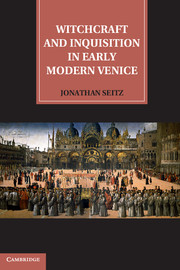Book contents
- Frontmatter
- Contents
- Acknowledgments
- A Note on Transcriptions and Citations
- Abbreviations
- Introduction
- 1 Witchcraft and Inquisition in the Most Serene Republic
- 2 Blackened Fingernails and Bones in the Bedclothes
- 3 Appeals to Experts
- 4 “Spiritual Remedies” for Possession and Witchcraft
- 5 The Exorcist’s Library
- 6 “Not My Profession”: Physicians’ Naturalism
- 7 Physicians as Believers
- 8 The Inquisitor’s Library
- 9 “Nothing Proven”: The Practical Difficulties of Witchcraft Prosecution
- Conclusion
- Appendix I
- Appendix II
- Bibliography
- Index
4 - “Spiritual Remedies” for Possession and Witchcraft
Published online by Cambridge University Press: 07 September 2011
- Frontmatter
- Contents
- Acknowledgments
- A Note on Transcriptions and Citations
- Abbreviations
- Introduction
- 1 Witchcraft and Inquisition in the Most Serene Republic
- 2 Blackened Fingernails and Bones in the Bedclothes
- 3 Appeals to Experts
- 4 “Spiritual Remedies” for Possession and Witchcraft
- 5 The Exorcist’s Library
- 6 “Not My Profession”: Physicians’ Naturalism
- 7 Physicians as Believers
- 8 The Inquisitor’s Library
- 9 “Nothing Proven”: The Practical Difficulties of Witchcraft Prosecution
- Conclusion
- Appendix I
- Appendix II
- Bibliography
- Index
Summary
The healing clerics so crucial to Venetians’ efforts to identify and understand supernatural illnesses practiced a craft that put them in a precarious position. On one hand, religious and social upheavals suggested to many that the devil was abroad in the land; demand for the services of exorcists therefore could be brisk. On the other hand, to combat evil forces could bring a certain guilt by association. After all, the ability to command demons to depart a demoniac or to reveal a hidden agenda differed only slightly from commanding demons to enter into someone or to reveal hidden treasures or secrets. In several famous episodes well studied by historians, clerics sparring with demons or treating alleged demoniacs were revealed as fraudulent, sinful, or heretical themselves. The Holy Office itself worried that exorcists might stray from legitimate rites, and it investigated and prosecuted several clerics in Venice for suspicious activities. Meanwhile, the Congregation of the Holy Office in Rome issued a number of warnings about exorcists’ departing the straight and narrow path of orthodoxy. Nevertheless, despite their somewhat tenuous positions, exorcists wielded substantial cultural authority when it came to matters on the permeable frontier between the natural and supernatural worlds. Precisely because of that tenuous position, and the intensive ecclesiastical oversight that came with it, we can uncover far more about how individual practitioners understood witchcraft and possession than we can for their lay colleagues, physicians.
- Type
- Chapter
- Information
- Witchcraft and Inquisition in Early Modern Venice , pp. 96 - 132Publisher: Cambridge University PressPrint publication year: 2011



